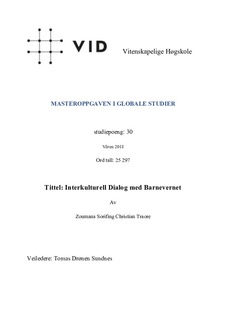| dc.contributor.author | Traore, Zoumana Sorifing Christian | |
| dc.coverage.spatial | Norway, Rogaland | nb_NO |
| dc.date.accessioned | 2018-10-26T13:04:21Z | |
| dc.date.available | 2018-10-26T13:04:21Z | |
| dc.date.issued | 2018-05 | |
| dc.identifier.uri | http://hdl.handle.net/11250/2569808 | |
| dc.description | Master's thesis in global studies. VID Specialized University, Stavanger, May 2018 | nb_NO |
| dc.description.abstract | Målet med denne oppgaven var å utforske kommunikasjon mellom afrikanske foreldre og barnevernet, og hvordan de kan øke forståelse for hverandre. For å belyse problemstillingen vil jeg rette fokus på 3 hoved kategorier:
- Etablering av kommunikasjon.
- Utfordringer i kommunikasjon.
- Bidrag til bedre kommunikasjon.
Dermed skal jeg bruke noen teoretiske tilnærminger innenfor kultur, kommunikasjon og interkulturell kommunikasjon og kompetanse. Dette innebærer at teoridelen skal definere kulturbegrep og gi oversikt over sentrale begrep som kulturkompetanse, kultursensitivitet, kulturforståelser og livssyn. Videre skal oppgaven presentere definisjoner innen kommunikasjon, samt interkulturell kommunikasjon og kompetanse også stereotyper, og hvordan disse begrepene kan forstås i forhold til interkulturell dialog mellom barnevernet og afrikanske foreldrene. Studien er basert på den kvalitative forskningsmetoden. Det innebærer her både ustrukturerte intervjuer og deltakende observasjoner. Informantene jeg intervjuet besto av 1 barnevernsarbeider i Sandnes kommune, 1 fokusgruppe med 7 barnevernsarbeidere i Stavanger kommune, og 5 afrikanske foreldre omkring Rogaland fylke. Deltakende observasjoner ble gjennomført under 2 informasjonsmøter mellom barnevernstjenesten Sandnes og nyankomne flyktninger fra Øst Afrika. Det var tilsammen 29 deltakere, en barnevernsansatt og to morsmålslærere. Oppgaven går ut på å klarlegge om afrikanske foreldre ofte bruker indirekte kommunikasjonskanaler for å innhente informasjon om barnevernet, noe som kan være skadelig for deres oppfatning av institusjonen og kan gjøre etablering av kontakt ved bekymringsmelding vanskelig med etaten. Videre blir det nevnt at barnevernarbeidere og afrikanere ofte har ulike syn på barneoppdragelsen, noe som kan oppleves utfordrende for kommunikasjonen mellom disse to gruppene. Dermed også for å skape bedre kommunikasjoner med afrikanske foreldre, er det ønskelig at barnevernet finner bedre praksis i bruk av begrepene kulturkompetanse og kultursensitivitet, slik barneverntjenesten i Sandnes kommune gjør. Og så må barnevernet mest mulig unngå "uvanlig atferd" av det slaget som ofte kommer fram i medieoppslag og den må kommunisere bedre om forandringene som er underveis i barnevernet. | nb_NO |
| dc.description.abstract | The Objectives of this thesis have been to explore communications between African parents and the Norwegian child welfare services (in Norwegian: “Barnevernet”), and how they can acquire more understanding of each other. My research focused on three hypotheses:
- Establishment of communication
- Challenges in communication
- Contributions to better communication
The theoretical approach was based on key concepts such as culture, communication, intercultural communication and competence and stereotypes. The terms for instance “cultural competence”, “cultural sensitivity”, “cultural understanding”, “life sight”, communication, intercultural communication and competence were very meaningful for this thesis and had to be addressed. Their understanding is therefore crucial prior an intercultural dialog between African parents and the child welfare service. The methodological approach used for data collection was based on qualitative research interview and participant observation. The gathering of the data was performed by conversations between African parents living in Rogaland county and the Norwegian child welfare services in the same region. Then I have been in contact with 5 Africans families, 1 child welfare service worker in Sandnes municipality, 1 focus group composed of 8 workers in Stavanger municipality. Also, I have been in interaction as participating observer in meeting between 2 refuges groups from East Africa with Sandnes municipality. It was 29 participants divided in 2 groups. An assertion in this thesis was that some African parents often used indirect communication channels to retrieve information about child welfare, something which could be detrimental to their perception of the institution and could make any contact with the agency more difficult. Furthermore, it appeared that the child welfare workers and some African families have often different views on childcare. This easily can lead to a lack of communication between these two groups. Thus, to improve communication with African parents, it is desirable that child welfare find better practices based on concepts of cultural competence and cultural sensitivity, as the child welfare service in Sandnes municipality provided. Also, child welfare service must avoid the most "unusual behaviour" that is often portrayed by media reports and must communicate better about the changes that need to take place in the child welfare services. | nb_NO |
| dc.language.iso | nob | nb_NO |
| dc.subject | child protection | nb_NO |
| dc.subject | intercultural communication | nb_NO |
| dc.subject | Barnevernet | nb_NO |
| dc.subject | interkulturell kommunikasjon | nb_NO |
| dc.title | Interkulturell dialog med barnevernet | nb_NO |
| dc.type | Master thesis | nb_NO |
| dc.description.version | submittedVersion | nb_NO |
| dc.subject.nsi | VDP::Samfunnsvitenskap: 200 | nb_NO |
| dc.source.pagenumber | 104 s. | nb_NO |
| dc.description.localcode | MV 17 Sc | nb_NO |
